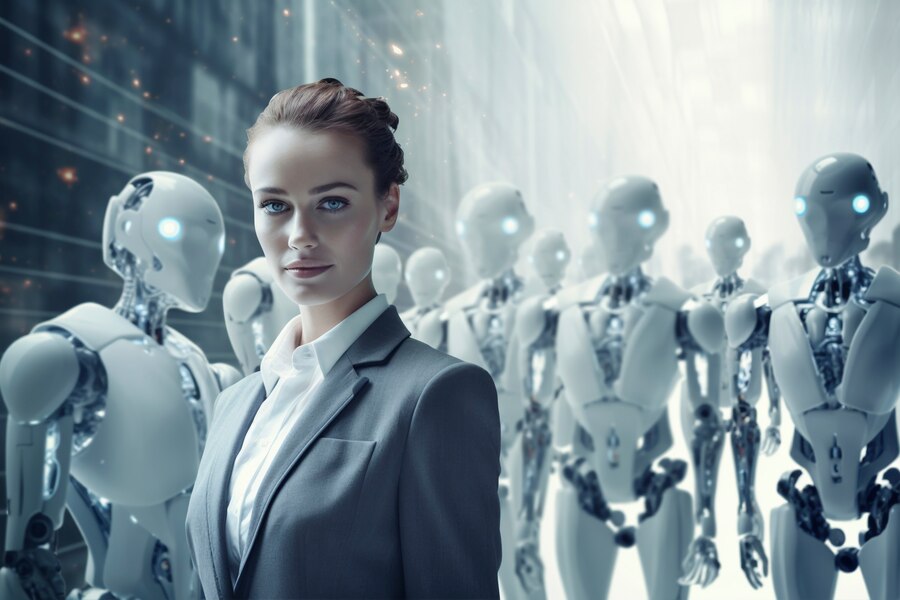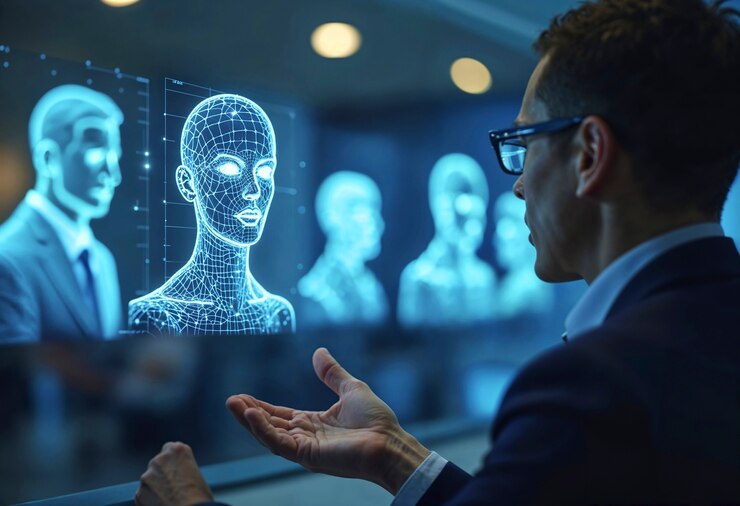The recruitment landscape is undergoing a seismic shift. With 87% of organizations now using AI at some point in the hiring process, artificial intelligence has moved from experimental technology to essential recruitment tool. The transformation is happening faster than many predicted, fundamentally changing how companies find, evaluate, and hire talent.
For HR professionals and business leaders, understanding AI’s role in recruitment isn’t optional anymore. It’s becoming the difference between companies that thrive and those that struggle to compete for top talent. This comprehensive guide explores how AI is revolutionizing recruitment, offering practical insights for organizations ready to embrace next-gen hiring practices.
What Is AI in Recruitment and Why Does It Matter Now?
AI in recruitment refers to using artificial intelligence technologies to optimize and automate various hiring processes. This includes everything from resume screening and candidate sourcing to predictive analytics that forecast hiring success. The technology leverages machine learning, natural language processing, and data analytics to make recruitment faster, smarter, and more effective.
The numbers tell a compelling story. The global market size of the AI recruitment Industry is $661.56 million as of 2023, with projections showing it will reach $1.12 billion by 2030. This explosive growth reflects a fundamental shift in how organizations approach talent acquisition.
But why now? Several factors have converged to make AI essential for modern recruitment. The average time-to-hire has stretched to 44 days globally, creating pressure to accelerate processes. Meanwhile, 62% of talent acquisition professionals say they are optimistic about AI’s impact on recruitment, recognizing its potential to solve long-standing challenges.
How Is AI Transforming Traditional Recruitment Processes?
The transformation begins with efficiency. Traditional recruitment methods often involve manually reviewing hundreds of resumes, a time-consuming process prone to human error and bias. AI changes this dynamic completely.
Modern AI-driven recruitment tools can analyze thousands of applications in minutes, identifying the most qualified candidates based on specific criteria. They don’t just look for keywords; they understand context, evaluate skills holistically, and even predict candidate success based on historical data.
Consider the screening process. Where human recruiters might spend hours reviewing applications, AI systems can instantly identify top candidates by analyzing multiple data points simultaneously. This includes work experience, skills, education, and even subtle patterns that humans might miss.
The technology extends beyond basic screening. 57% said it makes it faster/easier to write job descriptions, while 45% appreciate how it automates tasks, freeing recruiters for more strategic work. This shift allows HR professionals to focus on relationship-building and candidate experience rather than administrative tasks.
What Are the Key Benefits of AI-Driven HR Technology?

Speed and Efficiency Gains
The impact on recruitment speed is dramatic. Recruiters save an average of 4.5 hours per week by using AI for repetitive tasks. Some organizations report even more impressive results, with AI-powered video interviews reducing hiring times by up to 70%.
This efficiency translates directly to competitive advantage. In today’s talent market, the best candidates often receive multiple offers. Companies that can move quickly through the hiring process are more likely to secure top talent before competitors.
Cost Reduction and ROI
Financial benefits extend beyond time savings. Using AI reduces the average cost of hiring a candidate by 71%. These savings come from multiple sources: reduced recruiter hours, faster time-to-fill, and better candidate matching that reduces turnover.
For recruitment agencies and large enterprises handling high-volume hiring, the ROI becomes even more compelling. Automated processes mean teams can handle more requisitions without proportionally increasing headcount.
Enhanced Candidate Quality and Matching
AI excels at pattern recognition, making it particularly effective at matching candidates to roles. By analyzing successful employee profiles, AI systems can identify candidates with similar characteristics who are likely to succeed.
This precision matching goes beyond traditional keyword searches. AI can evaluate soft skills, cultural fit indicators, and even predict long-term success based on comprehensive data analysis. 64% of companies are still evaluating increasing their investment in automation and AI recruiting solutions, recognizing the quality improvements these tools deliver.
Diversity and Inclusion Advancement
One of AI’s most promising applications is reducing unconscious bias in hiring. When properly implemented, AI systems evaluate candidates based solely on qualifications and potential, ignoring factors like names, ages, or educational institutions that might trigger human bias.
AI hiring tools improve workforce diversity by 35%, demonstrating real progress in building more inclusive organizations. However, this requires careful attention to training data and regular audits to ensure AI systems don’t perpetuate existing biases.
Which AI Tools Are Reshaping Talent Acquisition?
Resume Screening and Parsing Systems
Modern AI screening tools go far beyond simple keyword matching. They understand context, recognize skill synonyms, and can even infer capabilities from project descriptions. These systems can process thousands of resumes in minutes, ranking candidates based on comprehensive criteria.
Conversational AI and Chatbots
AI-powered chatbots have revolutionized candidate engagement. Available 24/7, they can answer questions, schedule interviews, and even conduct initial screenings. When recruiting new employees, 58% of recruiters who use AI find it most useful for candidate sourcing.
Predictive Analytics Platforms
These tools analyze historical hiring data to predict candidate success, tenure, and cultural fit. By identifying patterns in successful employees, they help recruiters make more informed decisions about potential hires.
Video Interview Analysis
AI can now analyze video interviews for communication skills, confidence levels, and even personality traits. While not replacing human judgment, these tools provide additional data points for evaluation.
How Can Organizations Successfully Implement AI in Recruitment?

Start with Clear Objectives
Successful AI implementation begins with defining specific goals. Are you trying to reduce time-to-hire? Improve candidate quality? Enhance diversity? Clear objectives guide tool selection and implementation strategies.
Choose the Right Technology Partners
Not all AI recruitment tools are created equal. Look for solutions that integrate with existing systems, provide transparent algorithms, and offer robust support. McKinsey’s research on AI in the workplace emphasizes the importance of selecting tools that enhance rather than replace human capabilities.
Ensure Data Quality and Ethics
AI systems are only as good as their training data. Organizations must ensure their data is comprehensive, unbiased, and representative. Regular audits help identify and correct any biases that emerge over time.
Train Your Team Effectively
59% of HR employees are technically adept at using AI functions, but comprehensive training remains crucial. Teams need to understand both how to use AI tools and how to interpret their outputs effectively.
Maintain the Human Touch
The most successful implementations recognize that AI complements rather than replaces human judgment. While AI excels at data processing and pattern recognition, humans bring emotional intelligence, cultural understanding, and nuanced decision-making.
What Challenges Should Organizations Prepare For?
Addressing Bias Concerns
Despite its potential to reduce bias, AI can perpetuate existing prejudices if not carefully managed. Over 60% of Americans fear bias and potential discrimination in AI-assisted hiring processes. Organizations must actively work to ensure their AI systems promote fairness.
Managing Candidate Perceptions
66% of adults in the United States say they will not apply for a job that uses AI to help make hiring decisions. This resistance requires careful communication about how AI is used and assurances that human oversight remains integral to the process.
Ensuring Compliance and Privacy
With AI systems handling vast amounts of personal data, privacy and compliance become critical concerns. Organizations must navigate regulations like GDPR while maintaining candidate trust through transparent data practices.
Avoiding Over-Reliance on Technology
While AI offers powerful capabilities, over-reliance can lead to missed opportunities. 19% of organizations using AI admit the tool accidentally ignored qualified candidates. Human oversight remains essential for catching edge cases and ensuring fair evaluation.
What Does the Future Hold for AI in HR?
Emerging Trends and Technologies
The future promises even more sophisticated AI applications. Natural language processing will enable more nuanced communication analysis. Machine learning models will become better at predicting long-term employee success. Virtual reality may create immersive assessment experiences.
The Evolution of Recruiter Roles
Rather than replacing recruiters, AI is elevating their roles. Freed from administrative tasks, recruiters can focus on strategic talent planning, relationship building, and creating exceptional candidate experiences. Research from Simpplr on AI recruiting shows how this transformation enables recruiters to become true talent advisors.
Preparing for Continuous Change
The pace of AI advancement shows no signs of slowing. Organizations must build cultures of continuous learning and adaptation. Those who view AI as a journey rather than a destination will be best positioned for long-term success.
Real-World Success Stories
Major companies are already seeing impressive results from AI implementation. L’Oréal’s use of AI chatbots streamlined candidate engagement and scheduling, allowing recruiters to focus on high-value interactions. Amazon’s fulfillment centers use AI to track performance metrics, though this has raised important questions about the balance between efficiency and employee wellbeing.
Smaller organizations are also benefiting. Recruitment agencies using AI report filling 64% more vacancies than those relying on traditional methods. These success stories demonstrate that AI benefits aren’t limited to large enterprises.
Best Practices for AI Implementation in 2025
Pilot Before Full Deployment
Start with controlled pilots to test AI tools in your specific context. This approach allows you to identify challenges and refine processes before full-scale implementation.
Prioritize Transparency
Be open with candidates about how AI is used in your recruitment process. Vonage’s guide to AI recruiting emphasizes that transparency builds trust and can actually improve candidate perception when done well.
Regular Auditing and Adjustment
AI systems require ongoing monitoring and adjustment. Regular audits help ensure systems remain fair, effective, and aligned with organizational goals.
Balance Automation with Personalization
While AI handles data-intensive tasks, maintain personal touches throughout the candidate journey. Personalized communication, human interviews for final stages, and thoughtful onboarding remain crucial for candidate satisfaction.
Frequently Asked Questions
Will AI completely replace human recruiters in the future?
No, AI will not replace human recruiters. Instead, it enhances their capabilities by automating repetitive tasks and providing data-driven insights. Human recruiters remain essential for relationship building, cultural assessment, and strategic decision-making. The future involves human-AI collaboration, not replacement.
How can small businesses benefit from AI recruitment tools?
Small businesses can leverage AI to compete more effectively for talent. Many AI recruitment tools offer scalable pricing models, making them accessible to smaller organizations. Benefits include reduced time-to-hire, improved candidate matching, and the ability to manage recruitment efficiently without large HR teams.
What are the main risks of using AI in recruitment?
The primary risks include potential bias in AI algorithms, candidate privacy concerns, and the possibility of overlooking qualified candidates due to rigid criteria. Organizations can mitigate these risks through careful tool selection, regular auditing, transparent communication, and maintaining human oversight throughout the process.
Conclusion
AI in recruitment represents a fundamental shift in how organizations attract, evaluate, and hire talent. With 70% of employees expected to interact with AI-powered tools daily by 2025, the technology has become integral to modern HR strategies.
Success with AI recruitment requires thoughtful implementation, continuous learning, and a commitment to balancing technological efficiency with human insight. Organizations that embrace this balance while addressing challenges head-on will be best positioned to build exceptional teams in an increasingly competitive talent landscape.
The transformation is already underway. The question isn’t whether to adopt AI in recruitment, but how to implement it effectively to create better outcomes for both organizations and candidates. As we move forward, those who view AI as a powerful ally in the quest for talent will lead the way in next-gen hiring.
